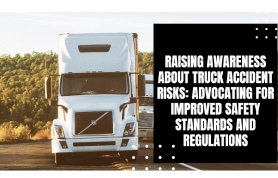Truck collisions affect individuals, families, and communities. According to the NSC, 5,700 heavy vehicles will be involved in fatal accidents in 2021, an increase of 18% from 2020 and 48% from ten years prior. The engagement rate per 100 million miles traveled by large trucks has increased by 7 percent since 2020 and 22 percent since 2010. These statistics demonstrate the need for commercial vehicle safety regulations.
Family life, local economies, and national security are all negatively affected when trucks crash. Commercial motor vehicle accidents are particularly devastating, so regulations and standards must be tightened to prevent them.
The transportation sector can be made safer and more efficient by raising awareness of truck accident risks and campaigning for safer norms and standards. Keep reading to find out what we can do to make our transportation systems safer.
Importance of Raising Awareness About Truck Accidents
Transportation accidents and their devastation can be reduced with knowledge. We can enhance the trucking industry by raising awareness of commercial motor vehicle dangers.
Driving safety can be enhanced if the public is educated about truck accident causes, such as fatigue, acceleration, and equipment failure. Safety laws and standards can also be improved through awareness. These accidents result in fatalities, injuries, and psychological trauma, which underscores the need for reform. Trucking can be safer and more responsible by raising awareness about truck accidents.
In 2020, there were 1,432 fatal crashes in South Carolina. Of these, 199 were caused by large trucks. Large trucks accounted for 14% of all fatal crashes in South Carolina in 2020.
The most common cause of truck accidents in South Carolina is driver error.
Other common causes of truck accidents include:
- Speeding
- Drowsy driving
- Fatigue
- Aggressive driving
- Distracted driving
Truck accidents can cause serious injuries or death. In 2020, 103 people were killed in truck accidents in South Carolina.
If you have been injured in a truck accident, you may be entitled to compensation. You should contact an attorney to discuss your legal options.
Here are some additional facts about truck accidents in South Carolina:
Large trucks are more likely to be involved in fatal accidents than other types of vehicles.
Truck drivers are often required to work long hours, which can lead to fatigue and driver error. Truck accidents can cause serious injuries, including spinal cord injuries, brain injuries, and amputations.
Truck accidents can also be very costly, both in terms of medical expenses and lost wages.
If you have been injured in a truck accident, it is important to seek legal help as soon as possible. An experienced truck accident attorney can help you understand your legal rights and options, and can fight for the compensation you deserve.
After a truck accident, truck accident attorneys can help you defend your rights and recover damages. Knowledgeable South Carolina truck accident lawyers can guide you through the legal process and hold the responsible parties accountable. However, prevention is crucial, and we can reduce accidents and avoid legal action by increasing awareness of vehicle accident hazards and advocating for stricter safety regulations and laws.
Common Causes of Truck Accidents
Driver fatigue, speeding, and equipment malfunctions are the leading causes of truck accidents. Long hours and pressure to meet deadlines can leave truck drivers fatigued and less alert, making it difficult to respond to unforeseen situations. Large trucks have longer stopping distances and may lose control at high speeds, which makes speeding a significant problem. Bad brakes or tires can also cause accidents.
Distracted driving, bad loading practices, and subpar roadways all contribute to the prevalence of truck-related collisions. In order to solve these problems, we need to enhance driver education, law enforcement, and vehicle upkeep.
Impact of Truck Accidents on Individuals and Communities
Truck accidents often have catastrophic results. Accidents involving trucks can result in serious injuries or even death. Medical expenses, lost wages, and property damage can place victims and their families in debt. Truck accidents can also impact cities, particularly if they result in hazardous material leaks or road closures that impede commerce. Other motorists can also experience fear and anxiety following a truck accident, highlighting the need for improved safety regulations and laws to prevent future collisions.
To ensure victims receive fair compensation and hold negligent parties accountable, a truck accident lawyer can be crucial. The auto accident attorney can investigate the accident, collect evidence, and negotiate with insurance or transportation companies to obtain full compensation for the victim.
In addition to guiding victims through complex legal procedures and deadlines, vehicle accident attorneys can safeguard their rights. Truck collisions are horrifying, but victims have access to legal recourse.
Current Safety Standards and Regulations
The Federal Motor Carrier Safety Administration (FMCSA) regulates the safety of commercial vehicles in the United States. These restrictions pertain to driver credentials, service hours, vehicle maintenance, and the transportation of hazardous materials. The FMCSA mandates that drivers obtain a commercial driver’s license (CDL) and undergo periodic medical examinations.
Drivers must maintain accurate records and adhere to driving time limits. Vehicles must pass safety inspections for their brakes, tires, lighting, and other components. To ensure public safety, transporting hazardous materials must adhere to stringent packaging, labeling, and route specifications. Safety standards and regulations reduce accident risk and assure the safety and efficiency of commercial motor vehicles.
Importance of Stakeholders’ Involvement
Essential to enhancing transportation safety standards and regulations are stakeholders. Stakeholders include trucking companies, transporters, safety organizations, government agencies, and the general public. Nationally, delivering goods by truck has a significant economic impact.
Attorneys have a stake in enhancing transportation safety laws. Legal counsel is available to trucking companies and transporters to comply with the law and reduce legal risks. Truck accident lawyers can also lobby safety groups, government agencies, and the general public for stricter safety regulations and standards. In addition to handling legal issues, their participation in the regulatory process can assure the legal survival of the industry.
Therefore, stakeholders must be involved in regulatory reforms to ensure the industry’s continued viability. Engaging stakeholders in the regulatory process can also foster consensus and reduce resistance to change, enhancing implementation and compliance.
Additionally, stakeholders can assist safety standards in addressing the most significant commercial motor vehicle concerns. Both employers and drivers have a say in how new safety laws influence the industry. The government can set safety standards, and non-profits can study accident data and recommend improvements.
The public can now voice their opinions and priorities, helping shape legislation that aligns with shared ideals. Drivers, businesses, and the general public can all benefit from a safer, more efficient transportation industry created through stakeholder participation.
Strategies for Advocating for Change
The changing regulations and standards for transportation safety require a multifaceted approach to succeed. Among the most effective methods are:

Public Awareness Campaigns
Building support for reform can be aided by campaigns to educate the public about the risks posed by truck drivers and the importance of adopting safer standards. To this end, we can use many methods, such as press releases, social media campaigns, and public gatherings.
Collaboration with Stakeholders
Trucking companies, drivers, safety organizations, government agencies, and the general public can support change through collaboration. Partnerships and stakeholder input can aid in goal attainment.
Legal Action
It may be necessary to take legal action to make a change. This includes filing auto accident lawsuits against transportation companies or government agencies to contest or enforce restrictions. Legal action can increase awareness and compel transformation.
Changing the safety standards and regulations of the transportation industry will likely require a combination of these techniques tailored to the issue.
Conclusion
Promoting safer regulations can lessen the occurrence of truck accidents and the suffering they cause. The trucking industry can become safer and more accountable if advocates for reform and educators work to raise public awareness of truck accidents.
Trucking is vital to our economy, but safety always comes first. Road safety may be improved by raising awareness and bringing transportation providers to account.
A truck accident attorney can assist you or a loved one who has been hurt in a truck collision. Advocacy and public awareness are crucial for averting these disasters.
Together, we can prevent truck accidents and make roads safer. Let’s work towards a better future for all.




